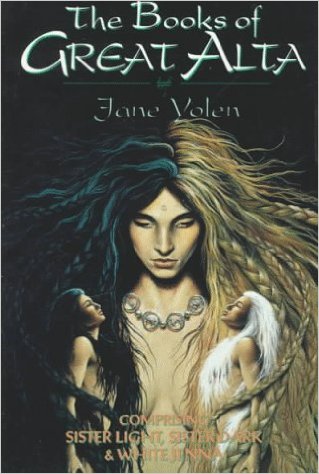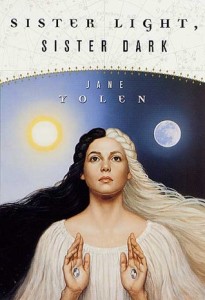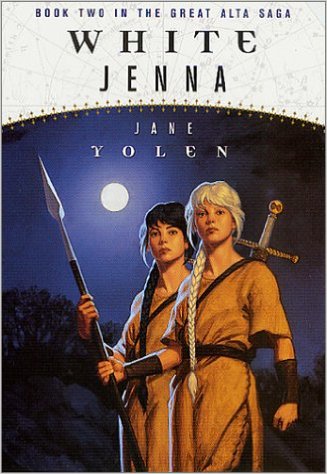 Marian McHugh wrote this review. Both of these books have re-released recently with the cover art shown below.
Marian McHugh wrote this review. Both of these books have re-released recently with the cover art shown below.
The Books of Great Alta is the compilation of Yolen’s two books Sister Light, Sister Dark and White Jenna. It is the story of the women of Dale, who worship Great Alta, the mother goddess.
In quite a number of ways, this book reminds me of Ursula Le Guin’s Always Coming Home. Both books are more than stories. They are anthropological studies of matriarchal civilisations created by the authors, the major difference between the two being that The Books of Great Alta is the study of a past civilisation, while Always Coming Home is that of a civilisation in the future.
The Books of Great Alta not only provides the reader with the story, but, in parallel, we are also introduced to the myth, legend, history, songs, ballad, and parables of the civilisation. Yolen has ensured that these writings have been distorted over time, so that what has been retold is different from the story that we are reading. A prime example of this is the corruption of Carum’s nickname Longbow to that of Langbrow, which the academics believe is his real name.
 We are also shown what happens to history when a matriarchal society becomes patriarchal. The stories are all about the women and how they helped the men overthrow the tyrant and put the rightful king on the throne. However, the histories, etc., show that it was only the men who were the victors. This represents that through time stories and histories change, and what we read is usually a corruption of the original and tainted with personal opinion.
We are also shown what happens to history when a matriarchal society becomes patriarchal. The stories are all about the women and how they helped the men overthrow the tyrant and put the rightful king on the throne. However, the histories, etc., show that it was only the men who were the victors. This represents that through time stories and histories change, and what we read is usually a corruption of the original and tainted with personal opinion.
The first book, Sister Light, Sister Dark, begins with birth and death: the birth of a baby girl destined to save her country, and the death of her birth mother. The midwife takes the child away to place her into the safety of Great Alta’s guardians. Unfortunately, she never makes it to the Hame (the home of the women who worship Alta) but is struck down by a wild cat.
The baby, having been placed in a tree for safety, is found by one of Alta’s warriors, Selna, and her dark shadow, Marjo. They take the child to the safety of the Great Hall and she is fostered by Selna and Marjo and given the name Jo-an-enna (‘jo’ for love, ‘an’ for white — the colour of her hair — and ‘enna’ for tree).
Unfortunately, things do not bode well and Jenna (as she becomes known) loses yet another mother, and this time is not fostered, but instead becomes the child of all the women in the Hame. This fulfils a dark prophecy about a girl child who would be orphaned thrice and belong to no one, and who would bring about the end for the new beginning.
 Jenna grows up where men do not come, amongst the women of the Hame and their dark shadows. She is taught the ways of life and chooses to study the ways of a warrior. It is when she goes on her missioning to visit the other Hames that things begin to change. She saves a young scholar prince, Carum, from certain death at the hands of his cousin, the Barnoo, also known as the Hound. From this point on their lives will be entwined.
Jenna grows up where men do not come, amongst the women of the Hame and their dark shadows. She is taught the ways of life and chooses to study the ways of a warrior. It is when she goes on her missioning to visit the other Hames that things begin to change. She saves a young scholar prince, Carum, from certain death at the hands of his cousin, the Barnoo, also known as the Hound. From this point on their lives will be entwined.
There is so much more to this story than I can write on paper. Slowly but surely, the reader is led to discover the lives of the light sisters as well as their complement, the dark sisters, those who can only be seen by light of the moon or by candlelight. The reader discovers along with Jenna the joys and sorrows of the lives of the women who revere Great Alta. There is of course sorrow, as this story is set in the time of war, but as always, good does finally triumph over evil.
I was totally absorbed by this story, and thoroughly enjoyed the mixture of the elements of the main story with historical information, songs, ballads and folklore. Jane Yolen is truly a master storyteller.
(Orb, 1997)
